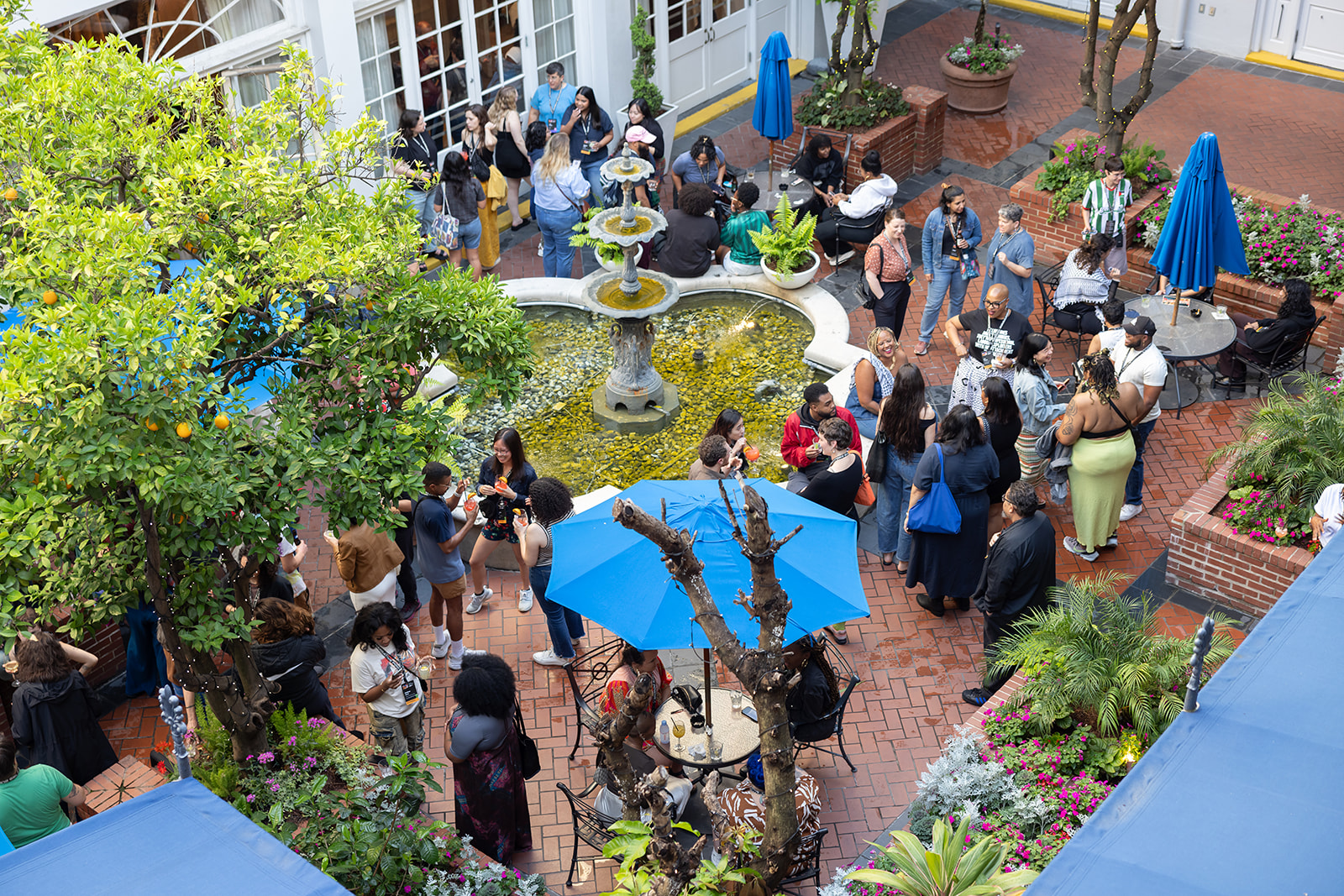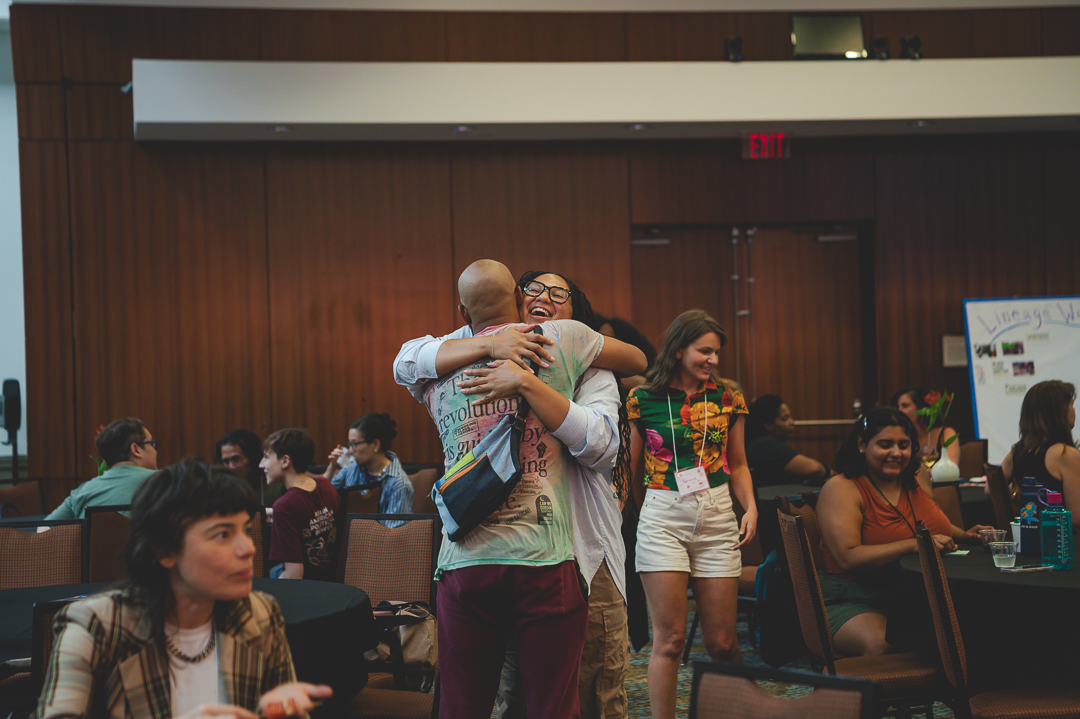The Narrative Power Summit was a call to move ourselves into community and engage in a collective reckoning with the terrain we must navigate and win, together. On the final day of the Summit, as the ballroom buzzed with the new tools and connections for the road ahead, RadComms Founder Shanelle Matthews delivered a closing speech that serves as both a battle cry and a strategic blueprint for progressive organizers, strategists and communicators. What follows are Shanelle’s full closing remarks. Her words remind us of what is at stake and the charge we must take to move forward with courage, purpose, and tenacity for the work ahead.
To see how this charge shaped the rest of the Summit, read the full recap blog here.
_______________________________________________________________________________________
Communicators, we are here because the social movement left has an opportunity. An opportunity to define a compelling and materially grounded story that moves beyond resistance and sets the terms of what comes next and distinguishes us from the Democratic Party and the broader political establishment. Yet we must confront the sober reality. The Left has suffered a significant defeat. We have been outmaneuvered and outresourced. We have been forced into a defensive position as oppositional forces often rapidly and unconstitutionally advance a fascist agenda. The consequence is political loss and material harm to millions of people. In this crisis, we must ask ourselves, what story does the social movement left need to tell right now?
How do we situate ourselves within this historical moment with clarity and with purpose? How do we mobilize a broad base with messaging that is visionary and materially grounded, one that inspires but also builds power at scale? Fashion offers a clear, emotionally compelling narrative, a return to law and order, a scapegoat for every crisis – a vision of power and domination. As we know, the left, in contrast, often struggles to articulate a bold unified alternative, falling into reactive, defensive, or utopian messaging that fails to connect with the daily struggles of working-class people. We cannot afford to remain on the defensive. Too often, we face a false choice between pragmatism and radicalism, between incremental wins and transformative demands. We must reject this binary. Our task is not to water down our vision, but to make it irresistible.
Since the November elections, the noise has been loud. The left is under the microscope. Some say we are siloed, elitist and navel-gazing. Others argue we should mirror the right, vertically integrated, ideologically aligned. Still, we won't critique our organizing reach, our digital presence, or our lack of ground game. These critiques are not without merit. Honest self-assessment is vital, and we can chew gum and walk at the same time. The two must live alongside strategy. That's why we are here, not just to diagnose, but to build, because the truth is, we have receipts.
For decades, we haven't just resisted, we've reoffered reality. We've exposed the war on terror as a racist machine of surveillance and control, and we've linked it to the occupation of Palestine, building solidarity from Gaza to Guantanamo. We've insisted the violence isn't coming from our communities. It's coming from the state. We've made the case that environmental justice is racial justice, that reparations are not charity, that indigenous sovereignty is law. We've reimagined survivor justice beyond carceral logic. We've fought anti-trans legislation with unapologetic truth-telling. We've said, relief must include all of us or none of us. We've moved the healthcare debate from who deserves care to care is a right. We've made fat liberation, long COVID, and HIV visibility, not just health issues, but rather narrative terrain. We shifted abortion from shame to power, from legality to love. We brought Wall Street to its knees and made the fight for 15 a household phrase. We've redefined what democracy could look like, then pushed policy. We've turned policy, data, and organizing to make it real.
We've turned visuals into weapons, made culture irresistible, turned influencers into organizers, and vice versa. We've occupied streets from Lagos to Liverpool to São Paulo, knowing that fascism is global, and so is our hype. This is not the story of failure. It's the story of strategic, intentional disruption, and it is still unfolding.
But the terrain is shifting fast, communicators. We are living through the end of US unipolar dominance. A multipolar world is emerging, one where China and other BRIC nations are challenging US supremacy. Neoliberalism is hemorrhaging legitimacy, and younger generations are not fulfilled by its promises. We are in a moment of imperial decline, but empire does not fall quietly. It lashes out through book bans, surveillance, censorship, manufacture of cultural worlds, and open repression. This is the terrain of reactionary politics.
Reactionary politics is a political stance that seeks to return society to a previous state often idealized and mythologized as a way to resist or reverse progressive change. It is fundamentally backward-looking, opposing movements that expand rights, democratize power, or challenge existing hierarchies. Reactionaries often support authoritarian leadership to, quote, restore order and preserve traditional structures of dominance, such as white supremacy and patriarchy and nationalism. They frequently use cultural nostalgia, like calls to make things great again, to justify exclusionary oppressive policies. From post-civil rights Jim Crow laws to today's efforts to ban books, restrict gender-affirming care, or criminalize protests, reactionary politics relies on fear, repression, and a romanticized past to maintain power in the face of social transformation.
Because of those reactionary politics, we are living in a time of rupture. For those of us committed to narrative power, that rupture is not unexpected. It is what happens when old myths crack under the weight of their own lies. The stories we were taught about who deserves dignity, about what counts as violence, about whose futures matter, are collapsing. Here's the thing. Collapse alone doesn't guarantee freedom. It just guarantees possibility. What comes next will depend on who is ready to narrate it. That's why narrative power today for a Radical Tomorrow isn't just a conference, it's a mandate. Because the future will be fought for on the terrain of meaning and radical communicators on the front lines of that fight.
Our movements are waiting for permission. We are asking institutions to validate them. We are building new common sense in real time. Palestinian resistance is shaping the global moral horizon, defying corporate media narratives and state-sponsored disinformation. Organizers are taking local struggle and scaling it to global urgency through disciplined narrative escalation. Mutual aid collectives continue to rewrite what public safety and community even mean. Our movements are not just resisting systems. We are rehearsing new worlds. We are decentralized but deeply aligned. We are youth-led, elder-guided, and ancestor-backed. And central to this is something radical communicators have always believed, that narrative is not a byproduct of movement. It is a precondition for it.
Resistance today isn't isolated, it's interwoven, because our conditions are linked. Climate collapse is linked to militarism. Migration is linked to colonialism. Gender violence is linked to racial capitalism. Our responses must be, too. You see it in Black and Palestinian liberation movements, cross-training and messaging in global solidarity. You see it in Indigenous climate defenders, building transnational campaigns that connect land defense to cultural survival. You see it in feminists, abolitionists, movements challenging borders, both physical and ideological. Global resistance today is about more than aligning hashtags. It's about building shared narrative infrastructure so our stories reinforce each other rather than compete for air time. Narrative workers are uniquely positioned to help to weave those stories together, not just to be heard, but to reorient the whole conversation about what freedom actually means.
We are in an ideological contest for the future. The Internet made it easier for us to publish, but also easier for disinformation to spread, for propaganda to flourish, for realities to fragment. While our opponents are building disinformation ecosystems, too often, our movements are still treating comms like an afterthought. But if narrative power is today's battlefield, radical communicators must be today's strategists. Because narrative isn't just how people interpret events, it's how they interpret themselves. If we don't provide a story that makes meaning of this collapse, someone else will. Someone will sell them fear instead of freedom.
Movements that last don't just win headlines, they win hearts, they win history, they win horizons. We know what sustains us. Political education that roots our people in power analysis, not just outreach. Narrative discipline that clarifies rather than flattens our differences. Cultural strategy that moves emotions faster than policy memos ever could. Story arcs that reach beyond the urgency of now and offer a glimpse into a livable tomorrow. From the Maroon communities that defied empire to the activists who reframed public health, to the Movement for Black Lives, redefining Black power in life, movements have taught us that the future belongs to those who narrate it.
Building a radical tomorrow means investing in narrative power today. That means training radical communicators like we train organizers, building independent media and cultural ecosystems, not just reacting to dominant media, and treating narrative work not as messaging, but as movement strategy. The stories we tell today determine what is imaginable tomorrow. That's why we're not here to win the next news cycle. We're here to shape the next century.
But you might ask, what does it mean to be a radical communicator? I'm going to borrow from our brilliant comrades, Malkia Devich-Cyril and Jennifer Soriano, who wrote the foreword for Liberation's stories. And in it, they assert, We are the orators, the griots, the futurists who breathe life into new ways of being, leading, and loving. We recognize polarization as a consequence of widening social and economic inequalities, only made worse by intensifying climate change. We understand that these inequalities can only be addressed by building power to shift conditions towards equality and transformative democracy. We refuse to surrender to policies and practices that shift conditions towards authoritarianism. We grow our ranks, expose dominant power, and engage people through vision and hope.
We build the infrastructure necessary to move narratives from marginal to mass line, which means contending and competing with corporate and elite power in a digital age. We are the meaning makers who promote agency, protagonism, and connection in a time of manufactured isolation and fear. Radical communicators, we are the narrators of this era. We are the architects of new mythologies. We are the stewards of political memory and collective imagination. The future isn't just something that's happening to us. It's something that we are narrating into existence.
Resistance.
The empire will try to write the ending, and we are here to make sure that they do not get the last word. Let's build the radical tomorrow by widening our narrative power today.
Thank you.
_______________________________________________________________________________________
This speech was delivered at the RadComms and ReFrame 2025 Narrative Power Summit in New Orleans. For more information about RadComms and their work building narrative power for progressive movements, visit their website.







































.jpeg)


.png)

%20(1).png)





























